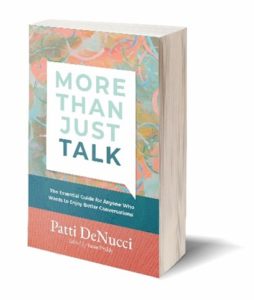“What’s the next question?”
That was the assignment I gave my audience during a recent presentation. They had just completed a short reflection assignment as well as a group discussion regarding how they could best benefit from the conference they were attending – and how they could build, diversify, and leverage their professional networks once they returned home.
Why that question?
It’s been my experience that before you can find the right answer(s), you need to identify the right question(s). (And if you really want to open yourself up to creative possibilities, preface your question(s) with “I wonder…” But that’s another blog post for another day.)
As I sit at my desk looking through a stack of 3 x 5 note cards containing some of the “next questions” offered up by some very bright and engaged project managers, I can see a few trends. Many people believe (incorrectly) the following assumptions about networking. So with today’s post I will attempt to dispute them. Here we go:
Networking should bring instant results. Sometimes it can, which can be wonderful. But perhaps you’ve heard this phrase: “She was an overnight success – after 10 years of hard work.” Networking can be a lot like that. It can be a slow, methodical, lengthy, convoluted, roundabout, and even frustrating process. Which is why the words “patience”, “courtship” and “value” are in this blog post title. The truth is, networking generally does not bring instant results. That’s why working regularly and steadily to create and maintain your social and professional reputation and connections should be – nay, must be – part of your everyday routine. Just like brushing your teeth. The legendary Harvey Mackay said, “Dig your well before you’re thirsty.” He’s absolutely right. (Print that out and paste it where you’ll see it everyday. It applies to many things in life.) 
Networking is so time-consuming! Oh yes, it can be. That is if you decide you have to attend every event, gathering, meetup, tweetup, happy hour, seminar, and conference you hear about. I know this because I’ve attempted to do it. It was nothing short of exhausting and wasted hours – even days – of my precious time. And it didn’t bring me the results I wanted! What if you committed to spending 5 to 30 focused, intentional minutes a day – everyday – on your networking? You could comment thoughtfully on a colleague’s blog or social media post, send a short email expressing gratitude or asking for feedback, share a link to an interesting article, leave a “just thinking about you / hope you’re doing well” voice message, enjoy a quick phone chat or coffee with a colleague, or invite someone to go have an express lunch. Networking doesn’t have to take over your life, but it needs to be part of it. Sadly, it’s the part that is very easy to neglect.
Networking is all about logic. “But I have so much to offer!!!” you say. “The person I’m trying to connect with needs to know me / hire me / buy from me / hear my idea / fund my dream business.” Nope. Like many other things in life, making and building successful professional relationships and getting the results you want is often more about emotion and chemistry than logic. In fact, networking is a lot like dating. (I can hear you groaning, but it’s true.) You often have to get in the door via an introduction or a connection from a mutual and highly credible friend. And if you don’t do it that way, here are a few steps you can follow:
- Look for opportunities to meet suitable candidates to add to your network (or pinpoint someone you want to meet). (If you’ve read my book The Intentional Networker or heard me present, you know how to determine who those suitable candidates could be.)
- Keep an eye out for and take note of said candidate(s). (Start with reading their LinkedIn profiles.)
- Put yourself in situations where you might actually meet and talk to these people. (Which is why you’ve got to move beyond the safety of your cubicle, close circle of friends, set routine, and sofa!)
- Gather the nerve to introduce yourself and find possible ways to converse in a friendly and intelligent manner.
- If you are successful in getting to this step, you can explore more ways to get to know each other better.
- Take note as to whether there is chemistry and value in taking the relationship further. And, remember, it’s a two-way street. If you both don’t “feel it” or see ways to bring each other value, there won’t be a relationship. At least not yet. (Nothing instant about that!)
Even if you do everything right, even if you are generous, thoughtful, brilliant, and charming, you might not get the results you want instantly – or ever. It can be very frustrating! But you have to stay with it. Build your skills, tweak your approach, and try again. (If this whole process and patience thing leaves you feeling like hiding under your desk, read my recent LinkedIn article about facing a very pervasive human fear: rejection.)
Networking is about you. Oh boy. Nothing could be further from the truth. Networking is always about the other person first. It’s about bringing value to him/her, even if it’s merely your full attention and presence, thoughtful listening, interested questions, and positive energy. Ever been to an event and had a conversation with someone who had an optimistic, friendly attitude and was an excellent and engaged conversation partner? One who didn’t do all the talking about themselves, but actually was interested in you and your career, life, interests, dreams, kids, dogs? And they really listened to you? (Sadly, this is not the norm.) Did you walk away thinking “What a cool / lovely / intelligent person! He was so interesting!” Of course you did. That’s the irony of networking. To be memorable in a positive way, make a good impression, and ultimately get the results you want in the long run, you don’t want to be the one who asks for an instant favor or yammers on and on about you-you-you. You don’t get until you give.
As you finish this post, one of two things will happen: 1) You’ll give up and go back to your usual routine and potentially non-effective networking habits (which could actually damage your ability to get the results you want). Or 2) You’ll want to discover more above how to network more effectively and regularly so you can prevail over the challenges, twists, and turns networking can bring.
If it’s 1), I’m really sorry. Because even with its challenges and pitfalls, networking is the way to become visible and successful in business. If it’s 2) be sure to get yourself a copy of The Intentional Networker. (Or re-visit the copy you already have.) It’s available on Amazon and other online retailers.
Another option? Hire me to present to your people – at your event or in your organization! I’m always thrilled to exchange emails or chat about the many ways we could work together. You can reach me (yes, ME, not an assistant or intern) at patti[at]intentionalnetworker[dot]com
I’ll finish with a testimonial that brings a huge smile to my face:
“The information [in The Intentional Networker] is so good, so well described, so valuable…I couldn’t help but think of Malcolm Gladwell’s Blink / Tipping Point when reading this.” – The 2012 Benjamin Franklin Awards – The Bill Fisher Award for Best First Book – Non-fiction



Patti,
You always hit the nail right on the head!!!
While I may be an ‘unconventional’ networker, there is no question that networking is the cornerstone to success!
Keep it coming!
Sonia
Thanks, Sonia! And I wouldn’t call you an “unconventional” networker – everyone is unique in their style and what works for them. Look how long you and I have stayed in touch – I credit YOU for that! Appreciate your friendship and encouragement, my friend!